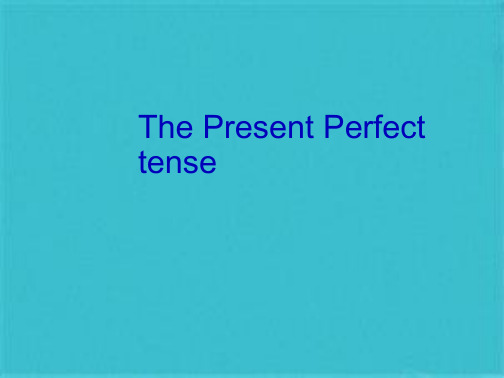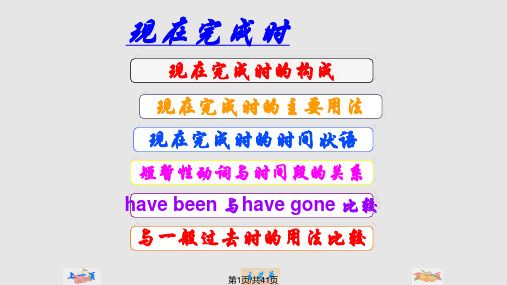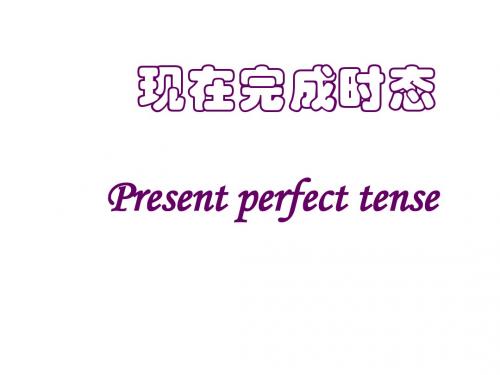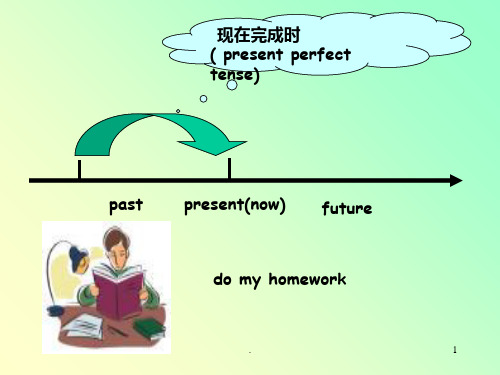vpp 现在完成时
现在完成时讲解(完整版)(共17张PPT)

4. My friends haven’t visited me ___s_in_c_efew days ago.
5. We haven’t used our car _____faorlong time .
I have planted all the trees. 注:主语假设是第三人称单数助动词用 has
finished 9. goes 10. have, found 11. is He’ll be back soon.
Where’s Li Ming ? He __________ (go) to the teacher’s office.
否认形式 haven’t ( have not 〕 +过去分词 I ________ (see) it last week.
Where’s Li Ming ? He __________ (go) to the teacher’s office.
hasn’t ( has not ) +过去分词 have, stayed 8.
have, finished
have, stayed
• 1. have, seen, saw 2. Has, finished 3. has, —Yes, I ___________ New York twice.
You have planted all the trees. since: (自…以来)
6. She hasn’t had a good cup of coffee _____yefaorrs.
7. Tom has worn glasses _______he was 7 years old. since
现在完成时语法(课堂PPT)

►① I began to study English three years ago.
►我三年前开始学英语 ►② I still study English now. ►我现在仍然在学英语 ►③ I have studied English since three
years ago.自从三年前我就开始学英语了.
► B:Yes,it has.是的开始了.
► B:No, it hasn&#nished your homework?
► 你做完功课了没有? ► B:Yes, I have.是的我做完了. ► B:No, I haven't 不,我没做完.
6
04现在完成时的特殊疑问句
12
►现在完成时四种用法的时间状语. ►继续: since ,for ,how long…?, all ►经验: often , ever , never , before ,
once , … times 等. ►完成: already , just , yet 等. ►结果: 不需要时间状语.
13
现在完成时
现在完成时描述的是过去发生而与现 在情况有关的事或状态,或是从过去 某时到现在为止这一段时间中发生的 情况,换言之,现在完成时表现的是从
过去到现在的事情
1
现在完成时的形式
►01现在完成时的肯定句 ►主语(I We You,第三人称复数)+have+过去
分词 ►主语(第三人称单数)+has+动词的过去分词 ►例:I have already finished the
►现在完成时的特殊疑问句分为两种情况,以下 将分别进行介绍:
►1 疑问词做主语时 ►句型:疑问词(主语)+have/has+过去分词+ ►例:A:Who has /have bought these
英语“现在完成时--课件(共14张PPT)

2. A: 这本书我已经买了两年了A. : I`ve had the book for two years.
B: 你在哪儿买的?
B: Where did you buy it?
A: 在我老家买的.
A: I bought it in my hometown.
3. A: 你看过这部电影吗? A: Have you seen the film?
注意点三:have been in, have been to 与have gone to 的用法 1、have (has) been in 表示“在某地(多长时间)”,现在仍在那里。常与表 示一段时间的状语连用。例如: Mr. Brown has been in Shanghai for three days. 布朗来上海已经有三天了。 They have been in Canada for five years. 他们到加拿大有五年了。 2、have( has)been to表示“曾经去过某地”,现在已经不在那里了。可与just, ever, never等连用,例如: I have just been to the post office. 我刚去过邮局了。 Mary has never been to the Great Wall. 玛丽从未去过长城。 Have you ever been to Hangzhou before? 你以前曾经去过杭州吗? Have (has) been to 后面可接次数,表示去过某地几次。例如: They have been to that village several times. 他们去过那个村庄好几次了。 3、have (has) gone to 意为“到某地去了”,表示到了某地或正在去某地的途 中。总之,说话时该人不在现场,例如: ----Where is Tom? ----He has gone to the bookshop. 他到书店去了。 Jack Johnson has gone to London. 杰克.约翰逊到伦敦去了。
英语知识点:现在完成时(Present Perfect Tense)

英语知识点:现在完成时(Present Perfect Tense)
3. 主谓一致 主语为第三人称单数时,助动词用has;其他情况用have。 六、练习题 1) 填空: a) She __________ (finish) her work already. b) They __________ (not see) this movie yet. c) __________ you ever __________ (be) to New York? d) He __________ just __________ (leave).
英语知识点:现在完成时(PreБайду номын сангаасent Perfect Tense)
3. 表示经历或经验 - 用于描述某人曾经有过的经历或经验。 - 例句:She has traveled to many countries.(她去过很多国家。) 4. 表示刚刚完成的动作 - 通常与just连用,表示刚刚发生或完成的动作。 - 例句:He has just finished his dinner.(他刚吃完晚饭。)
英语知识点:现在完成时(Present Perfect Tense)
五、注意事项 1. 区别一般过去时 一般过去时强调动作发生在具体的过去时间,而现在完成时强调对现在的影响或从过去持 续到现在。 示例: I went to the store yesterday.(一般过去时) vs.I have gone to the store.(现在完 成时) 2. 不可与具体的过去时间状语连用 如yesterday, last week等不能与现在完成时连用,但可以与不具体的时间状语连用,如 ever, never, before等。
英语知识点:现在完成时(Present Perfect Tense)
现在完成时讲解经典PPT课件

I have left hometown for 10 years. W
I have been away from hometown for 10 years.
上一页
第27页主/共菜4单1页
下一页
have been 与have gone 的用法比较
have been to 意思是“到过,去过”,表示曾经到过某处,但现在人不在 那儿。
have gone to 意思是“去了”,表示已经去了某地,现在人可能在去的途 中或已在那儿了。
have been in 意思是“呆在某处一段时间了”
上一页
第28页主/共菜4单1页
下一页
用have been to, have gone to, have been in的 适当形式填空
past
present(now)
future
do my homework
第3页/共41页
现在完成时的主要用法
1.表示过去发生的某一动作对现在造成的影响或结果。
-- It’s so dark. --Someone has turned off the light. (有人刚把灯关了,对现在造成的结果是:现在很黑) -- Are you free? --I have finished my homework. I am free (我已经完成了家庭作业,对现在造成的结果是很有空)
1. - Where is Tom? – He has gone to the library.
2. How many times have you been to Paris?
3. I haven’t seen you for a long time. Where have
英语语法现在完成时PPT课件

12. open /close---- be open/be closed (门开/关了十分钟了)
常见的这种动词的转化有以下几类: go there—be there, come back—be back, borrow—keep, buy/catch—have, arrive—be in, begin—be on, open—be open, close—be closed, die—be dead, leave—be away from, get up—be up, fall asleep—be asleep, become—be, join—be in/a member of, receive—have, catch/get a cold—have a cold, get married—be married,come → be in, finish → be over, leaver → be away
She has gone. (她走了。) 从这句话中动词所用的现在完成时态可 以看出“走”的动作是过去发生的,而 对现在所造成的结果是她不在这里了。
Look! The blackboard is so clean now. He has cleaned the blackboard.
(他已经擦过黑板了。) 这句话所表示的结果是黑板现在是干净的。
Class began five minutes ago
Class has been on for five minutes.
现在完成时用法三:
• 现在完成时和一般过去时都能表示过去发 生过的动作,但现在完成时表示过去动作 对现在的影响,并且表示这一动作已完成 或还可能继续下去;而一般过去时与现在 的情况没有联系,仅表示过去的动作,且 这一动作到说话时已终止。因此现在完成 时不能与表示明确的过去时间如when, in1949,yesterday,last week等的状语连 用,并且用when或where对这些时间和地 点状语提问时,一般只用一般过去时。
二。英语中两种语态

2. The fifth generation computers, __C__and
perfected now. A. developed
B. have developed C. are being developed
D. will have been developed
3. --- _A___ the sports meet might be put off. --- Yes,it all depends on the weather.
6. The new bridge _B__ by the end of last month.
A. has been designed B. had been designed
C. was designed D. would be designed
7. When part of a pencil is in a glass of water,
(3)谓语动词变成相应的被动形式。
改为被动语态
He plants
主
谓
trees in spring.
宾(受动者)
Trees are planted byhim in spring.
主动语态变被动语态口诀:
宾语提前主语变, 原主变宾by后见, 时态人称be关键。
Tom will clean the room tomorrow.
例:This book is worth reading.
• 4. want/need/require+doing =want/need/require+to be done
例:My bike needs repairing. • =My bike needs to be repaired. • 我的自行车需要修理。
初中现在完成时系列讲解---完美PPT课件

常与already(已经), yet(已经), just(刚刚),ever(曾经)等词连 用.
already: 常用于肯定句中. yet: 常用于否定句,疑问句尾.
.
7
Translate the following sentences.
1. 你已经找到你的书了吗? (find-found) Have you found your book yet?
现在完成时 ( present perfect tense)
past
present(now) future
do my homework
.பைடு நூலகம்
1
Mother: John, clean your teeth please. John: Mum, I have already(已经) cleaned them.
3 bring _b_r_o_ug_h_t_-___b_r_ou_g_h_t 15 keep_k_e_p_t _-___k_ep_t_
9.know-- knew--known 10.make— made--made
11.run-- ran--run 12.say—
said--said
13.see-- saw-seen 14.find— found--found
15.draw-- drew--drawn 16.get—
got--got
People have read newspaper for about 400 years.
.
18
since , for 的用法:
since: (自…以来)
Take notes
1)since+时间点
He has stayed here since 5 o’clock.
- 1、下载文档前请自行甄别文档内容的完整性,平台不提供额外的编辑、内容补充、找答案等附加服务。
- 2、"仅部分预览"的文档,不可在线预览部分如存在完整性等问题,可反馈申请退款(可完整预览的文档不适用该条件!)。
- 3、如文档侵犯您的权益,请联系客服反馈,我们会尽快为您处理(人工客服工作时间:9:00-18:30)。
重点难点:
现在完成时:
构成:S+have/has+Vpp
用法:(1)表示过去发生或已经完成的某一动作对现在造成的影响或结果。
常与just, yet,ever, never,already, before 连用。
1.Have you ________ been to Beijing? No, _____.
2.I have ______ finished my work.(已经).
3.They have ______ left here. (刚刚)
4.I have ______ (从来没有)met such a man __________. (以前) (2)表示动作或状态开始于过去, 一直延续到现在, 甚至还可能继续延续下去. 常与for , since, so far, in the past/ last +一段时间, recently 等连用。
动词用延续性动词。
常见的非延续性动词与延续性动词的转换。
come/go –be in/on
go out-be out
leave – be away
begin/start – be on
buy – have
borrow – keep
join – be a member
die – be dead
catch a cold – have a cold
become – be
fall asleep – be asleep
open – be open
get to know – know
close-be closed
1.He died twenty years ago.
1) He ___ ____ _____for twenty years.
2.Jim came to the city last year.
1)Jim ___ ____ ____the city____one year.
3.have (has) been to sp.曾经去过某地,(或多少次)而现在不在某地have (has) gone to sp. 已经去了或正在去某地的路上
have (has) been in sp 在某地(多久).
1).The twins are not at home. They _________ the West Hill Farm.
2).A: Where ________you________? I’m looking for you.
B: I _________ the library.
3).---How long ______ his uncle _______ Germany?
--- I don’t know. But I know that he __________ there many times.
4).We can’t fi nd Zhang Ming .Where ___ he __?
A. does, go
B. does, gone C did , gone D. has , gone to
5).Neither you nor Jim ___ to Japan.
A have been B. has been C. went D. has gone
6).Where is your mother ? She ___ Shanghai. She won’t be back ___ next week.
A. has gone to ,until
B. has been to , until
C. has been to ,after
D. has gone to , after
4.寻找现在完成时中的―时间段
现在完成时态表示过去已经开始并持续到现在的动作或状态,多和表示一段时间的状语连用,其标志通常是―for+一段时间或―since+点时间
I have been a teacher for ten years old. 我当老师有十年了。
Have you worked in the city since three years ago?
你自从三年前就在这个城市工作吗?
注意:since作连词后接句子时,该从句一半过去时,其主句依然用完成时态.
5.寻找完成时态的状语标志
在做时态题时,句中现在完成时的状语标志是我们选用现在完成时态的首选条件。
常见的状语标志有yet, already, never, lately, recently, ever, just, before, twice(表示次数的词)等。
They haven't finished their work yet.他们还没有完成工作。
We have never seen a more interesting film. 我们从来没看过比这更有趣的电影。
